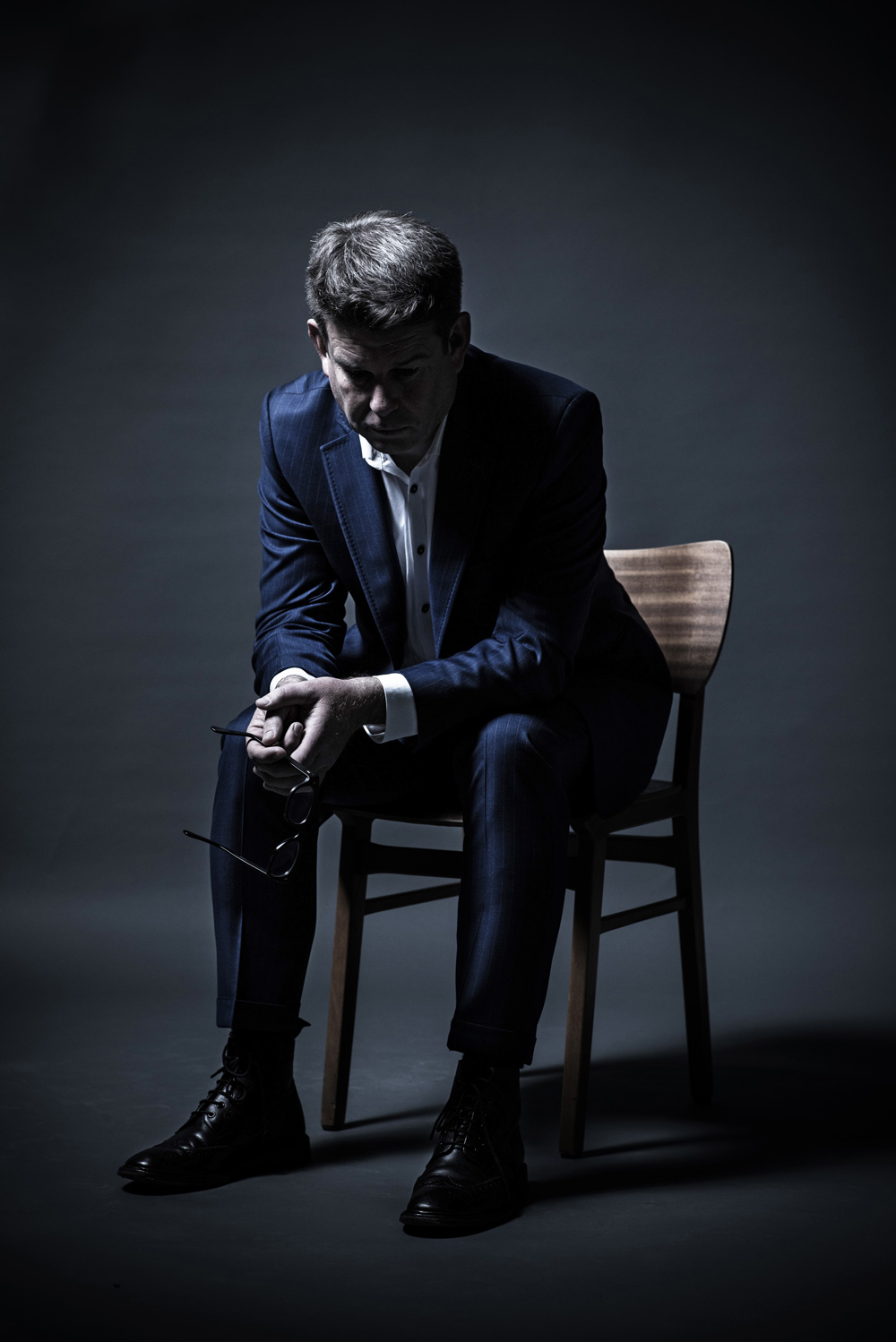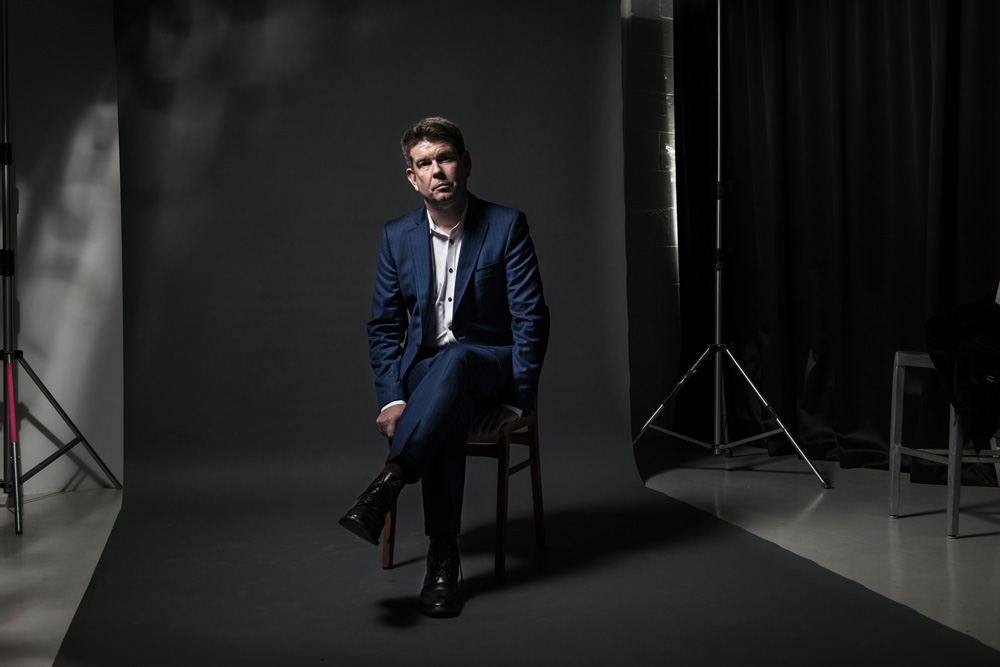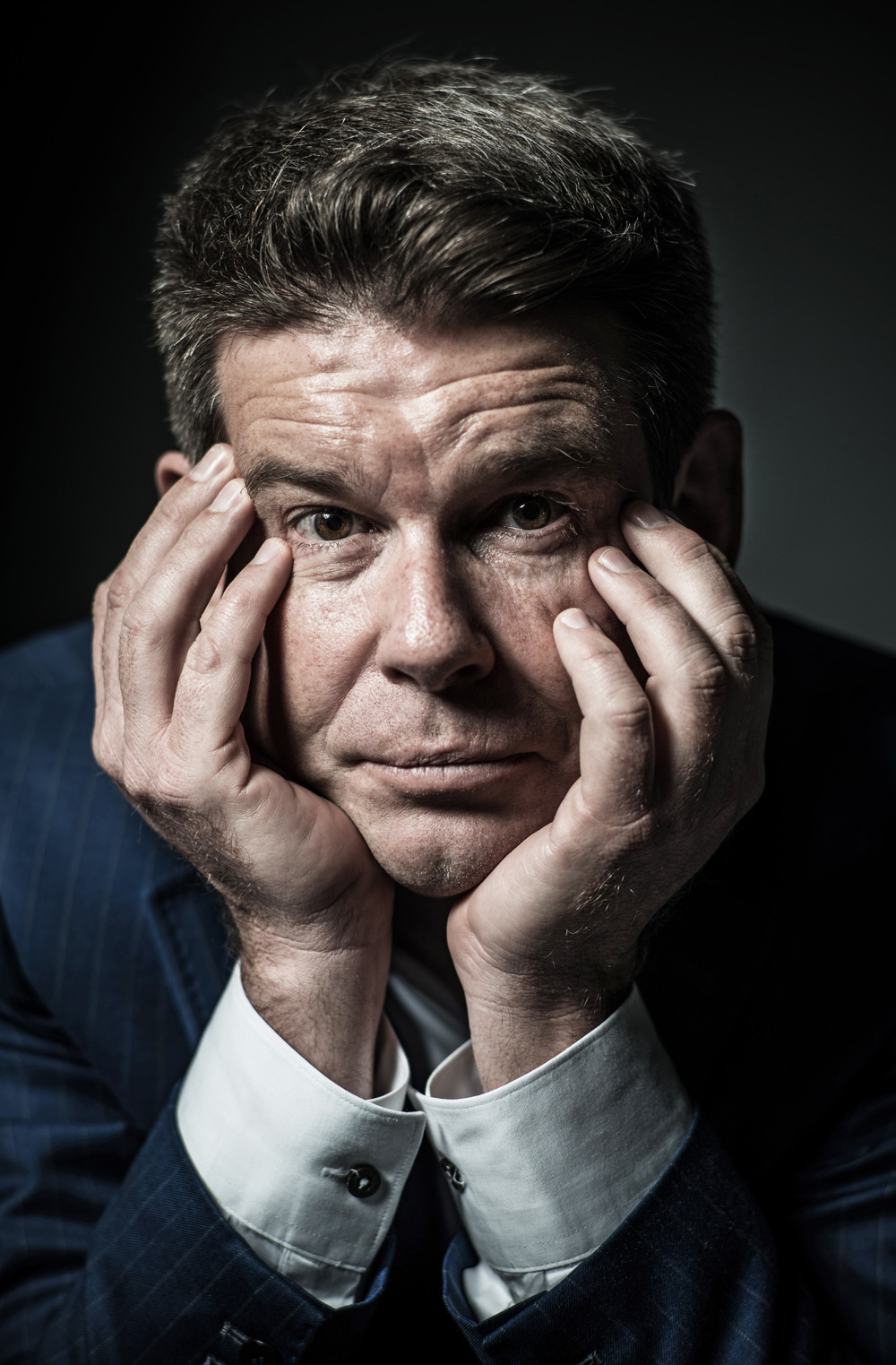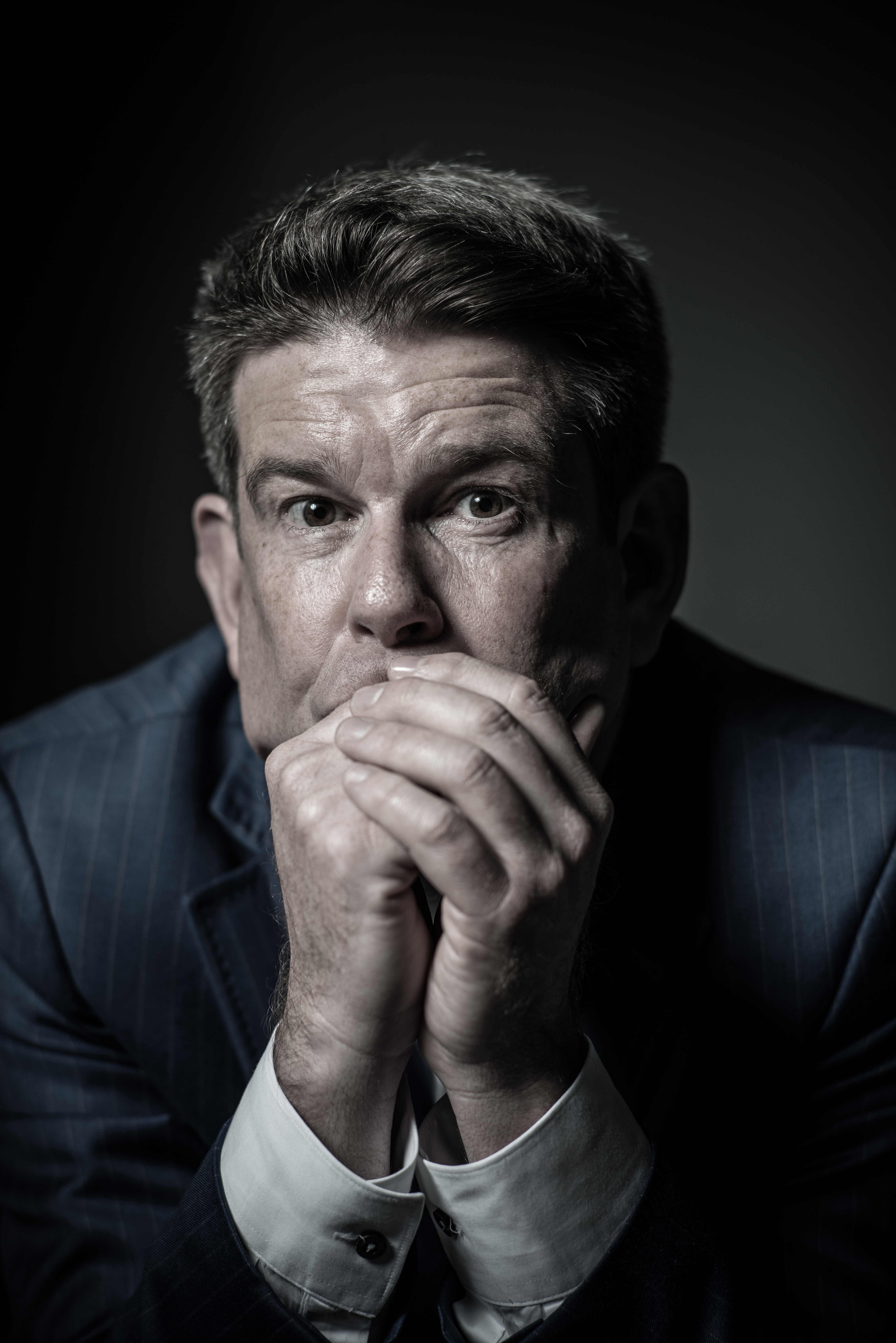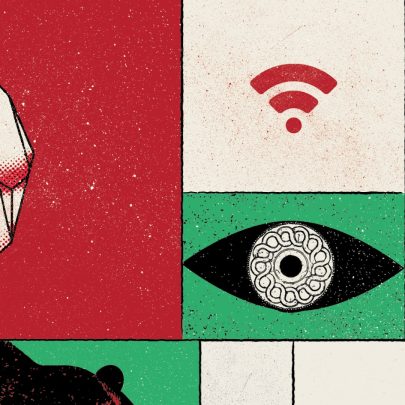Nov 19, 2015 People
John Campbell is back, microphone at the ready. But five months after his awful exit from TV3, how is he holding up?
This article was first published in the November issue of Metro. Photos: Alistair Guthrie.
There’s more flesh on him now, and it makes his face both rounder and longer. Something about the jowls, the set of the mouth, an inclination to look down and away. You can’t not notice the sadness.
He’s not fit. Hates the gym, doesn’t do anything else. He still looks good, at 51, but where adrenalin used to keep him lean and hungry, now, five months after he was shown the door at TV3, a 20-minute walk almost does him in.
He’s still irrepressibly John Campbell, though. When he arrived late for our photo shoot, forehead beaded with sweat, he was full of both apologies and enthusiasm — full of delight at meeting whoever would be in the room — and dressed exactly as you’d expect, in white shirt and suit.
“I fucking love suits,” he said, and he really meant it. We’d asked for extra clothes options; he brought another suit, and two other business shirts, white with a thin stripe, both the same.
Later that day, he gave a talk to staff at bFM, the campus-based radio station. He was still wearing the business shirt and suit jacket, now with a matching waistcoat, and leather business shoes. But now he had on jeans, the cuffs rolled.
He was unfailingly polite and obliging for our photographer and did everything asked of him, except dance. Would he maybe raise his arms and move around a bit? Nope.
“When I was a kid,” he said, “I used to get the DB Cricket Annual, and I would analyse every player, what their weakness was, what their average score was, and I would pick my 1st XI. I was about nine years old. I would shuffle the team around, cross people out and put new people in, and then finally I would have my XI ready to go. Listed on a piece of paper.”
What did you do with it?
“Well, what I would do is go out in the backyard and throw the ball against the wall, and I would be them. All the players. I would have entire games.”
By yourself?
“Yeah.”
But you’re not an only child.
“No, but my sister is six and a half years younger than me. So she was useless.”
Is that harsh?
“I love her to bits but she was useless. Really, it was a most exciting time. And all I had was a piece of paper. My new job, you know, it feels like that now.”
At RNZ, Campbell told me, “no one is saying we should do the Kardashians because they seem to get a lot of clicks”.
John Campbell’s new job is with Radio New Zealand, where he will present a revamped version of Checkpoint, the current affairs show that airs at 5pm weekdays on RNZ National. It’ll be 90 minutes, half an hour less than the existing show, and will be called Checkpoint with John Campbell. It starts in late November.
At RNZ, Campbell told me, “no one is saying we should do the Kardashians because they seem to get a lot of clicks”.
For 10 years, Campbell was the host of Campbell Live, TV3’s flagship 7pm show that followed the news with a mix of current affairs investigations, dispatches on life all over the country, hard-hitting reports and light-hearted entertainment.
By the beginning of 2015, MediaWorks, the company that owns TV3, was unhappy with the show. Social (and some mainstream) media was alive with conjecture that the company bosses were close to the government and thought there was an anti-government bias in the show. (As Herald media analyst John Drinnan reported, MediaWorks chief executive Mark Weldon was a friend of the Prime Minister, and board member Julie Christie, who also had an executive role overseeing programme development, was close to other cabinet members.) Others said the CEO and board just didn’t like Campbell Live.
The key facts were simpler: as the season fired up, Mike Hosking and Toni Street had resurrected the fortunes of TVNZ’s competing show Seven Sharp, and Campbell Live’s ratings were very weak. The company had to do something.
On April 9, MediaWorks’ head of news, Mark Jennings, announced a review “to improve commercial performance of the 7pm TV3 time-slot in a changing television market”.
Campbell fought back, appealing to the public to watch the show. Immediately, ratings jumped from 245,000 to 296,000, and by April 27, they had climbed to 419,000. Some days Campbell Live outrated both 3 News and The X Factor; more than 100,000 people signed a petition to save it. It was a spectacular demonstration of support.
None of it mattered. On May 21, MediaWorks announced the show would close. One week later, on May 29, John Campbell said his last goodbyes — to 532,000 viewers, his largest audience ever — and left the building.
Hilary Barry and Mike McRoberts kiss John Campbell.
He wasn’t sacked. Jennings said they asked him to stay, to co-host a new show, but Campbell felt it was an offer he couldn’t accept. They paid him a little more than they were legally required to, but he didn’t have a contract with a golden parachute and he didn’t get one.
Since then, TV3 ratings across the board have collapsed. The replacement show, Story, presented by Duncan Garner and Heather du Plessis-Allan, is doing poorly, and so is 3 News. Reality show MasterChef had its worst season ever and The Block has suffered too. Inevitably, advertising revenue has been damaged.
On the face of it, MediaWorks’ moves to “improve commercial performance” have undermined the entire TV3 brand.
It’s all cold comfort to John Campbell, who wasn’t ready to leave. Since May, he’s been keeping his head down, declining all interviews, but in early October he finally agreed to talk to Metro. I took him out to dinner.
“I grieved for our friendships, I grieved for the beautiful solidarity of our team, I grieved for the kind of journalism we were doing.”
He told me that Linda Clark, the lawyer and sometime broadcaster he hired to represent him, had some good advice. “She said to me, ‘You’ll grieve.’ And I thought, ‘No I won’t, you grieve when someone dies,’ but I absolutely did grieve. I grieved for our friendships, I grieved for the beautiful solidarity of our team, I grieved for the kind of journalism we were doing.”
Isn’t grief usually more personal?
“Yeah.”
Did you grieve over what was publicly stated about your ability?
“No.”
Did you grieve that you personally would not be able to do that work anymore?
“Yeah, I grieved for that. I grew up at TV3. I started there when I was 27, as a general reporter… I went into the [parliamentary press] gallery quite soon, working under Bill Ralston, which was just wonderful. I found a vocation. I found a job I was lucky enough to really love, I found people whom I loved working with.”
Later, on Campbell Live, “there was never a day, when we drove down the ramp and out of the carpark, where I didn’t think, we’re off on an adventure”.
You grieved because you lost the thing that made you happy.
“Yeah.”
He fiddled with his fork.
“Although I’m finding it again. And I’m not just saying that because I’ve got a new employer.”
He works for Carol Hirschfeld now. She’s RNZ’s head of content and has been both his colleague and his boss before. I asked her if she thought Campbell had changed. Is he sadder now?
“No,” she said. “He’s got the same almost ludicrous enthusiasm for his work.”
She added that it had been “a very bruising experience” for him. “Anyone would be affected by it. John bore it with grace.”
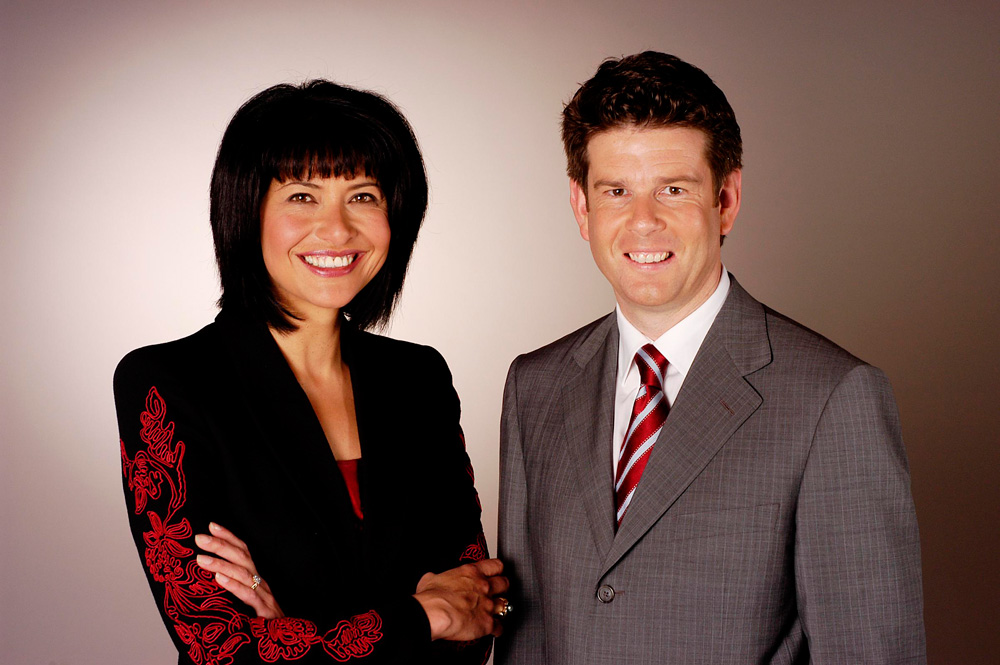 Carol Hirschfeld and John Campbell, 3 News presenters; 1998-2005
Carol Hirschfeld and John Campbell, 3 News presenters; 1998-2005
I asked Campbell if it had been hard to meet the world with enthusiasm when you turn up to work every day and your employer doesn’t seem to want you there.
“I ignored it. We just kept making the programme, and we just ignored all the evidence that didn’t suit our belief that we were going to stay. I know that’s odd, but it was the only way to behave.”
He doesn’t like talking about himself. A lot of media people, you can’t stop them. Campbell just keeps changing the subject. He said, “I felt really sad afterwards, for a long time, and I still feel sad about it. It wasn’t about me or my career or anything, because what I believe we created was a model of constructive, illuminating, empathetic television that also had enough going for it commercially to be sustainable. And I was devastated by our inability to make that work. That’s all.”
When I asked what he had discovered about himself, he talked about discipline and determination, which for someone as driven as he is would not have been discoveries at all.
We were walking along the waterfront, after dinner, quite late at night. A carload of young blokes were parked up, and they wound down the windows to salute him. Fans everywhere.
I asked, did he discover a deeper capacity to be hurt than he knew he had?”
He hesitated, and then from the deepest reaches of that lovely radio voice of his, he said, “Yes.” And then sort of sealed himself up.
When you left, did you find yourself doing weird, uncharacteristic things?
“No. I stayed at home.”
Did you get out of bed every day?
“My family bought me a dog. I lost my job on the Friday and I think we had a dog by Saturday afternoon. I would go out once a day to take the dog for a long walk. I’m not — please forgive me — but I’m not really a dog person.”
It’s a schnauzer/Jack Russell cross. A barky, nippy little mutt. The family wanted the dog; quite possibly, the job loss was their excuse to get it.
Did it change you? Are you now a dog person?
“No, not really.”
I went to see former Campbell Live staffer Ali Ikram, who said, “John has not got well-honed self-preservation instincts.”
I asked Campbell, was he in hiding?
“I didn’t answer calls, emails, anything. I didn’t want to see anyone at all. The only people I saw were the other people who’d left Campbell Live, and some of the people who stayed. We’d go somewhere cheap for lunch, like a little Malaysian or a burger joint. We didn’t talk about it much. We didn’t talk much at all. We’d all just sit there.”
Hilary Barry cries on air as she farewells John Campbell
Despite what its detractors may think, Radio New Zealand is not a ghetto. Around half a million people listen to RNZ National in an average week, and the audience for Checkpoint averages 183,000. That’s shy of the 233,000 daily average of viewers for 3 News in early October, but way more than the low of 124,000 reached by 3 News on a recent Sunday. Checkpoint beats Story’s 145,000, and despite all the hoo-ha about commercial drivetime, it is usually the most listened-to programme in its 5pm timeslot.
As for Campbell Live, in its dark days in the winter of 2014 and the late summer of 2015, it frequently fell below 150,000. Campbell is likely to have a bigger audience on radio than he had on TV during those times.
The new Checkpoint is going to be “somewhat different”, although the “rigorous journalism” of outgoing presenter Mary Wilson — her bulldog ability to ask the hard questions — supposedly won’t change. “She’s extraordinary and I’m going to try and honour that. But maybe, just from time to time, we might lighten up a little bit?”
They’ll have cameras in the studio. Not like on Paul Henry, which is a hybrid show made for both television and radio. Checkpoint with John Campbell will be radio, but “you’ll be able to watch us make radio”.
Hirschfeld called it “fast-paced news and current affairs” to which Campbell will bring his “particular acute” and “slightly more conversational” style. And his love of sport. “Well, why not? It’s a field John’s very good at.”
Campbell said, “What I get to do is be a journalist in an environment that wants my journalism, and I do feel really lucky.”
At dinner, while he and I were talking about the show, a waitress came over. She had a speech to make, and she was nervous.
“I’m really sorry to interrupt but I just wanted to say, I’m from Christchurch and I just wanted to say a really heartfelt thank you.”
Campbell beamed at her. “That’s so nice. Do you work here?”
“I do. I’m just about to leave, I have to catch the last train home, so that’s why I’m interrupting you guys. But I just really need you to know I have a lot of time for your work — you and your team’s work.”
“Thank you so much. What’s your name?”
“Yayne.”
“Nice to meet you, Yayne.”
And on they went. Yayne — which is pronounced a bit like Janie, but with a soft first letter — told her story of Christchurch. She had a personal connection to one of the people who had died, and Campbell was effusively warm, concerned and encouraging. She poured out her thanks; he poured out his pleasure.
“By the way,” she said, “I watched your last show and I was there crying, because I think it’s a real shame. But I’m looking forward to your next journey.”
And he said, “Yayne, can I ask you something? Do you know anything about Radio New Zealand? Do you ever listen to it?
“I, um, I listened to it when I was younger because my granddad did.”
“Because of your granddad.”
“Yep, so a lot of talkback, I know.”
“No, no talkback. Radio New Zealand doesn’t do talkback.”
“Oooh.”
“No.”
“Well, yeah no, I’m not sure then.”
“Right, well we need you to listen.”
“Yep. Yep. I will, because I know that you’re doing a show, I already knew that, and I would love to listen and I hope that you keep on doing amazing work.”
They wound it up.
“It’s lovely to meet you,” he said.
“Anyway, enjoy the rest of your meal.”
“Thank you so much.”
“Thank you.”
“Thank you very much. Okay, bye bye.”
Campbell will always, just naturally, say the last thank you. When she had gone, he said, “Talkback. See, she doesn’t listen. A brilliant, lovely kid who doesn’t even know what…”
That’s John Campbell now. Still incredibly pleased to meet everybody. You haven’t just made his day, you’ve enriched his life. You’ve enlarged his soul. And wherever he goes, there are people whose lives he has touched. He’s enlarged their souls.
And he’s going to be at Radio New Zealand, which many of his fans have never heard of.
One by one, every member of the restaurant floor staff came over to talk, and he was pleased to talk with every one of them. On the street afterwards, people stopped him, to shake his hand, get a photo. I’ve seen a lot of politicians doing this, but none who could do it half as well as Campbell, and the reason is obvious: it’s heartfelt.
Mind you, you can read the adulation how you want. People still tell him they love what he does and watch him every day. He finds it hard to explain that he hasn’t been on TV for months.
“Up until May, I was working hard to save the programme. Every day. And I remember early on, someone said to me, ‘Look, whatever issues there are that make you unpopular with certain people will be overcome by the sheer pragmatism of commercial success. So, if you pull an audience, whatever people think about you, you’re going to survive.’ So we went through this review period and I thought, ‘Yep, we’re getting the numbers, getting the numbers,’ but then it just didn’t work out. So I… Yeah.”
When did you realise?
“Late. Really late. I tend to believe that if you work hard enough and if you exercise your will hard enough, you can make shit happen. But I couldn’t make that shit happen. We just couldn’t.”
So there he was, in winter in Grey Lynn, where he lives, wandering the blustery streets, a yappy little dog wrapping its leash around his ankles, plastic bag at the ready. Nothing to do, nowhere to go, no one he wanted to see. All that hard work and skill and goodwill, come to nothing.
Believing, trying still to believe, despite it all, that in life it’s good to think the best of other people, and good to assume they will think the best of you.
What happened to Campbell Live wasn’t simply an evolution in the critical 7pm timeslot. MediaWorks was repurposing the entire network, focusing on entertainment in an attempt to boost ratings ahead of a possible share float or sale. This is the stuff that makes Campbell soapbox angry, and not just for personal reasons.
So there he was, wandering the blustery streets, a yappy little dog wrapping its leash around his ankles, plastic bag at the ready.
“What was TV3? First of all it was the underdog battler that went into receivership twice and somehow survived. It had a news programme that no one watched, but it just kept trying, and it put comedy on television, it put Westies on television in Outrageous Fortune, it put Polynesians on television in bro’Town, it did great comedy, and there were brilliant people taking great risks… It gave a professional platform for people to earn a living, and to show us ourselves, and to be good.
“And then along come some business people who think, ‘We’re going to stamp a template on it.’ But actually they’ve missed what TV3 stood for. TV3 had a connection with New Zealand that wasn’t simple, that did celebrate our ability to battle and get on with life, all of those good things we believe about ourselves, the can-do, the number-eight wire, all of that shit, with a lovely sprinkling of parody, of not taking ourselves too seriously.”
Ali Ikram believes that when Campbell and Hirschfeld began presenting 3 News in 1998, it was the start of TV3 finding its own authentic voice. Prior to that, he said, the network’s key faces had largely come from TVNZ. Campbell was at the core of the brand, and that continued when he and Hirschfeld moved from the news to launch Campbell Live in 2005.
Campbell said, “And just at a time where free-to-air television was under pressure anyway and beginning to die, you take your core identity and you say, ‘Oh, well we’re going to dispense with that.’ It just seemed like dumb commerce to me.”
But is it dumb commerce? Very few programmes of any kind last longer than 10 years. MediaWorks had lost the rights to key soaps and dramas and did not have the resources to replace them. It wanted entertainment-driven ratings and it didn’t seem unreasonable to think reality shows would be popular: that’s been true for some years and Julie Christie is an expert at making them.
More than all that, there’s the question of who free-to-air broadcasting is for. The blunt view is that the market now is based on the people left behind by the digital revolution. Those who do not want or cannot afford or lack the technical confidence to choose their own viewing entertainment on TV, computers, phones and whatever comes next.
Maybe commercial broadcasters don’t have a choice; maybe Campbell is just an out-of-touch sentimental lefty. But that ratings surge in April and May was astonishing: the sort of thing for which most broadcasters would sell their grannies.
Ikram said the philosophy of Campbell Live was: if you have faith in your audience, they will have faith in you. And it was, so demonstrably, a show dedicated to the idea that whoever is watching, they don’t deserve to be given rubbish. Is there a more important goal for any media, anywhere?
It was never about the money. “I didn’t have a pay rise in eight years. I didn’t ask for one, I never went in. It just didn’t seem appropriate.” Losing his job, for John Campbell, was a blow to his faith: when you work hard and treat people well, how is it you get treated like shit?
It’s hard, day after day, to work out how to deal with the most powerful people in the land and the impact of their decisions on everyone else. When you do it, you assume you’re supported by your own company. Hirschfeld was right, though: throughout it all, Campbell stayed graceful. And professional.
Dealing with the powerful is something he’s been rethinking. I asked him what he thought of John Key.
“You know, I don’t want to express an opinion about John Key because I’m working for Radio New Zealand and I want him to front up and know that he will get a fair hearing.”
Campbell used to say all journalists are subjective, to a degree, and therefore the important thing is to be open about it. Acknowledge your bias.
“But I was wrong, because what that did was allow people to dismiss me as a lefty. I don’t want to be dismissed as a lefty anymore. It’s more important than that. I want politicians to think that when they come on air with me they are going to be treated fairly. Unless they behave in a way that means they don’t deserve to be treated fairly. But we’ve got to be empirical about that, we’ve got to wait till it happens, and I can’t make up my mind in advance.”
I asked him about interview techniques. How do you get past the media-managed on-message approach of most politicians now? When they simply ignore your questions and say what they want to say?
“It’s a nightmare. I don’t know how you deal with it. Somebody said to me recently, maybe Carol or Mary Wilson, that actually you don’t have to tell the audience that the person isn’t answering the question. The audience knows.”
Which may be true, I said, but it doesn’t mean you’ve got the answer you were looking for.
“No, you haven’t. But are you ever going to get it?”
He also said, “My approach to interviewing is like batting in cricket. Some days you’re smashing the ball around the park and other days you’re out first ball.”
“I don’t want to be dismissed as a lefty anymore. It’s more important than that.”
In 2003, Metro asked him, if he could be someone else for a day, who would it be? He said Tana Umaga, then captain of the Hurricanes and vice-captain of the All Blacks.
Campbell was delighted to be reminded of this. “Did I? You know who I’d like to be now? It’s still, well, I dunno.”
It’s not Richie, is it?
“No, it’s not. I don’t want to be Richie McCaw for a day. I want to be someone who’s fearless, and Richie’s cautious. But I want to say on the record, boy, I admire Richie enormously.”
He phoned me a few days later, worried that I might have thought he didn’t rate Richie McCaw.
“He’s an extraordinary human being, an exceptional human being,” he said. “I can’t speak highly enough of him. But I don’t think people understand what it would be like to be him. No privacy, every single place he goes. He’s the last person on the planet I’d want to be.”
Adoration on super-steroids: it’s not Campbell’s idea of fun. His choice for a day, then?
“I’d be Eliota. You know, Eliota Sapolu, the Samoan rugby player who complains about the treatment of second-tier nations? He owns a nightclub in Samoa. I went there; it’s like a kind of San Francisco beat club in the 1960s: it was playing esoteric jazz, and there were people who seemed to be moving slightly out of time with the music, and they were talking about ‘come the revolution’ and all that, and I was so happy. Because I love rugby, and I love politics. And he’s bright and he’s fearless. And he plays rugby. So that’s who I’d be for a day.”
The perfect guy?
“Yeah. And he’s handsome! I mean, you know, I’m still not reckless about causing offence. I still don’t want to do it unnecessarily or unreasonably. Whereas Eliota doesn’t give a shit. I’d quite like to try it for a day and see what it was like.”
The greatest broadcasters are the most singular. They create their own idiosyncratic model, in their speech patterns, their obsessions, their way of engaging with the world, and that uniqueness allows us to feel they are being truthful to themselves, and therefore that we know them, and therefore that those things give us a direct line to their hearts. Think Paul Holmes, Kim Hill. John Campbell.
It’s the true secret to broadcasting success, and it holds for entertainment as much as for news and current affairs. How strange, then, that it eludes every broadcasting boss who puts a show pony up to do a real broadcaster’s job.
Campbell also has something he shares with some other great broadcasters, but not all: a desire to speak for people who may not otherwise find a voice. He’s done it for Christchurch, obviously, but also in relation to children’s lunches and disasters, and by exposing a whole host of shysters. And because he values language, he employs a rhetoric that gives nobility to those people’s aspirations.
How different this is from, say, Mike Hosking’s repeated why-don’t-you-all-just-pull-your-socks-up-and-by-the-way-look-at-my-fabulous-life.
“If I had my time over again, I wouldn’t be such a serious teenager. Fuck I was serious. Man I was serious. And I wouldn’t yell at Ken Ring.”
He would, though. It was after the second Christchurch earthquake, 185 people were dead and tens of thousands more were very frightened, and Ken Ring, the “alternative weather” guy, went on Campbell Live to say it was all about the moon. When Campbell tells the story he’s still full of scorn.
He’s been at RNZ for a few weeks now, making podcasts, planning the new show, reacquainting himself with the organisation that gave him his first job in journalism, back in 1989. It’s changed a bit, especially after all the new-brooming by Hirschfeld and CEO Paul Thompson: Guyon Espiner and Susie Ferguson at Morning Report, Jesse Mulligan in the afternoons, Mihingarangi Forbes on the Maori affairs beat, Wallace Chapman on Sunday mornings.
There has been some anxiety around the fact Campbell is replacing Wilson, who moves into management. Campbell doesn’t think it’s warranted. Not now. “No one who has arrived there in the last year or two is in any way uncertain about how good RNZ’s traditional strengths are, and have been, and will continue to be… I think at first there was this terrible trepidation: are we going to throw the baby out with the bathwater? But the baby is safe.”
What most of the competition is doing, he added, “is not aspirational, it doesn’t make you feel good, it’s not illuminating and actually the market is just saturated. I think people will start thinking quality is going to be our point of difference. Quality independent journalism, quality production standards, quality research, quality investigation. I truly believe that.”
Which was good to hear, although he did spoil it a little by adding, “But I think there is a determination to widen the paradigm of its connectivity.”
Broaden the audience, he meant.
Can it be done? Will Yayne and those blokes parked up in the car and all those people who tell him they’re still watching him start listening?
“There’s the people who listen to RNZ already, who admire it and enjoy it, but there’s a whole lot more who don’t, who may have never heard of it. They say, ‘What’s that, is it talkback, is it Radio Sport, is it RadioLive?’ We’re going to try to get to more of those people.
“We don’t want to compromise, we don’t want to sell anything short. But if there are new ways of connecting with a whole lot of people who don’t even know where RNZ is on the dial, then we’ll do it.”
New ways? “Streaming,” he said, although it was really more of a mutter. Social media, and the TV cameras in the studio. RNZ is no slouch at this: in August, its online services, including on-demand, downloads, live streaming, iTunes and apps, received 1.36 million “requests for content”. But for Campbell, the broadcast — the content, not the vehicle — is the thing.
“I think the people who don’t listen to RNZ are the people whose stories don’t get told. Actually, my sense is they don’t listen really to any news service, because they never hear themselves in it. So actually a lot of them, bless them, are probably listening to music stations. Because radio, the only time they’re mentioned is in sports stories or as a kind of dysfunctional underclass. And I just think, why would you listen to media who treat you like that, who never take you seriously, who never give you a voice, who never actually listen when you ask questions?”
How will they know to listen now? There was a time Campbell used to see himself all the time on bus backs, but that stopped a while ago — a sure pointer to TV3’s desire to ease him out. But RNZ doesn’t do bus backs. It doesn’t advertise itself at all.
Hirschfeld said, “If you make it relevant, that gives you popularity.”
Campbell said, “I feel like if we tell stories in a way that is fair and balanced and reflective and two-eyed, we’ll get those people to tune in. I know, it’s a bit rich coming from me, because here I am, rounded vowels and all that shit, but I feel like if we can tweak… that if it’s called Radio New Zealand it should be all of New Zealand. That’s what I hope to do, really.”
Does decency leave you lonely? Is “ludicrous enthusiasm” a mask for the boy who worked out how to be happy playing cricket by himself? I asked him, what do you do in the weekends?
“Nothing.”
Literally nothing?
“I watch my son play rugby and if my daughter did anything in the weekends…”
It was getting late, he didn’t mean it the way it sounded, and corrected himself. “She dances, she’s a brilliant dancer, but their performances are only occasional. I do feel immensely proud…”
Campbell reckons in the eight years his son has been playing rugby, he’s “probably missed 10 games”. Even when he’s out of town, on the Friday night he always goes home. “Wherever I am, I get the last flight back, or I drive back or whatever, and I just love it, I love it.”
What else makes up the “nothing” of his weekend?
“Mostly I just stay at home, listen to music, read.”
He didn’t go through the boxed sets thing and hasn’t seen The Wire and any of the Scandinoir thrillers. Gets his TV through Sky.
“An All Black or a rock star or an airline pilot, I wouldn’t be any of them. I’d still be a journalist.”
“I watched The Knick. I thought it was genius, I thought it was stunning. God, I loved that. I watched Girls. I think Lena Dunham — Dunham, Durham, what’s her name? — is just brilliant.”
He cares about wine. Did a speed read of the list when he arrived at the restaurant and later remembered the vintage of a wine the waitress mentioned. What he likes: low fruit, and if it’s red, full of “tobacco and leather and dirt and all that stuff”.
He’s been listening to “lots of sad songs, lots of guitar songs”. Laura Marling, Tiny Ruins, Aldous Harding. “I don’t see the point in listening to the old stuff. I want music that keeps me moving forward.”
And the reading?
“Lots of nonfiction. I’ve been reading about journalism, listening to lots of podcasts, trying to work out what makes good radio.”
He said, “If I could be an All Black or a rock star or an airline pilot, all the things you dream of being when you’re a little boy, or I did, I wouldn’t be any of them. I’d still be a journalist. I would do what I do now. Isn’t that an amazing way to feel? Having said that, I’m fucked.”
Are you?
“Yeah, I am.”
You’re exhausted.
“I am. I’m getting unexhausted.”
It’s quite hard, isn’t it?
“Yeah, it is.”
When the adrenalin dies, you go to a place in yourself you didn’t think you’d ever go.
“No, I didn’t even know I had it.”
Brooke, our main waitress for the evening, appeared. “Sorry, I’m off home now but I just want to say it’s been an absolute pleasure serving you both.”
She said that, but she was looking squarely at him.
“Thanks, Brooke, thanks very much,” he said, drawing out the last two words for remarkable emphasis.
“And I hope to see you both here again soon. Take care.”
“Thank you, it’s been lovely service, Brooke.”
“No worries, my pleasure.”
“Thanks, Brooke. Thank you.”
In early October, John Campbell travelled to Wairoa, on the road between Napier and Gisborne, to interview freezing workers in dispute with their employer, Affco. In the podcast of that story (which is online at radionz.co.nz), Campbell greets workers picketing on a bridge with every ounce of his habitual enthusiasm.
It’s a split workforce, with several of them having accepted the company’s terms and gone back to work, and the stories they tell him are awful: partners on different sides no longer living together; mothers and sons not speaking. He’s having a wonderful time, not because he relishes the anguish, but because he’s giving them the chance to talk about their lives. Ignored, sidelined, fearful and yet determined people, whose values he shares.
Campbell’s star witness, the man who sums up, well, pretty much everything, is a worker who has given up and found another job.
“I felt drained, to be honest. I was just mentally and emotionally drained.”
“How and why?” asks Campbell.
“Well, just the negative energy, I suppose you’d say.”
“And what are you doing now?”
“I work at the mill. On the kilns, drying wood of all things.”
“Do you get treated better there?”
“Yeah. Much better. Much better.”
“Can you explain the difference?”
“Appreciation. For who you are and what you can bring. That’s what I’ve noticed, mostly, that they appreciate you for what you can do and what you can offer. And people want to be appreciated. It’s a basic thing.
Checkpoint with John Campbell, RNZ National, weekdays from 5-6.30pm radionz.co.nz

